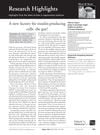Search
for
Sort by
Research
510-540 / 1000+ results
research Skin Shedding and Tissue Regeneration in African Spiny Mice (Acomys)
African spiny mice can regenerate skin, hair, and cartilage, but not muscle, and their unique abilities could be useful for regenerative medicine.

research The Rotterdam Study: 2016 Objectives and Design Update
The Rotterdam Study found risk factors for elderly diseases, links between lifestyle and genetics with health conditions, and aimed to explore new areas like DNA methylation and sensory input effects on brain function.

research Stem Cell-Derived Motor Neurons from Spinal and Bulbar Muscular Atrophy Patients
The study suggests that motor neurons created from stem cells of patients with spinal and bulbar muscular atrophy show signs of the disease, including changes in protein levels and cell functions.

research Endocrine Disorders in Woodhouse-Sakati Syndrome: A Systematic Review of the Literature
Woodhouse-Sakati syndrome often causes sexual development issues, hair loss, learning disabilities, deafness, muscle contractions, limb pain, and diabetes.

research Structural and Dynamic Insights into Substrate Binding and Catalysis of Human Lipocalin Prostaglandin D Synthase
The research explains how a human enzyme binds and processes its substrate, which could relate to its role in biological functions and hair loss.

research Effects of Dihydrotestosterone on Rat Dermal Papilla Cells In Vitro
Dihydrotestosterone (DHT) doesn't affect rat skin cell growth, but it does change cell cycle, protein levels, and other cell functions, potentially shortening hair growth cycle.

research Transcriptomic Profiling in Silurana Tropicalis Testes Exposed to Finasteride
Finasteride affects frog testes by increasing testosterone, decreasing 5α-DHT, and impacting genes related to reproduction and other functions.

research Research Highlights: Latest Articles in Regenerative Medicine
New treatments for diabetes, central nervous system repair, and cartilage injury were found, and a way to create functional hair follicles from stem cells was developed.

research Potential Health Benefits of Dates Based on Human Intervention Studies: A Brief Overview
Dates may improve heart health, fight infections, protect kidneys, reduce inflammation, support pregnancy, promote dental and bone health, enhance mental function, and have anti-cancer properties, and are also beneficial for skin and hair care.

research Treatment of Female Sexual Dysfunction in Postmenopausal Women: What Is the Evidence?
Hormonal changes and psychological issues can cause sexual dysfunction in postmenopausal women. Behavioral therapy is recommended first, with hormone replacement helping some symptoms but not libido. Testosterone can improve libido, but its effects on overall sexual function are unclear. Emotional and relationship issues should be addressed before using medication, and the benefits and risks of testosterone supplementation should be considered.

research Anhidrotic Effect of Intradermal Injections of Botulinum Toxin—A Comparison of Different Products and Concentrations
Different botulinum toxin products and concentrations can effectively reduce sweating, itching, bladder pressure, hair loss, and muscle spasms.

research Side Effects and Adverse Events After Treatment With Teprotumumab for Thyroid Eye Disease: A Retrospective Observational Case Series
Teprotumumab for thyroid eye disease commonly causes fatigue, brittle nails, dry eyes, hair loss, muscle spasms, and dry mouth, with rare serious events like blood clots.

research Dermatomyositis Disease in Dogs
Dogs with dermatomyositis, especially Collies and Shetland Sheepdogs, need better treatments for their skin and muscle inflammation.

research Clinical Alert
In 2002, various drugs caused serious side effects, including vitamin B12 deficiency, heart issues, blindness, hypersexuality, allergic reactions, blood clotting problems, pupil dilation, capillary leak syndrome, muscle breakdown, hepatitis, skin reactions, and lupus.

research The Corpus Cavernosum After Treatment With Dutasteride or Finasteride: A Histomorphometric Study in a Benign Prostatic Hyperplasia Rodent Model
Dutasteride caused more penile tissue changes than finasteride, possibly increasing erectile dysfunction risk.

research Complications of Cushing's Syndrome: State of the Art
Cushing's syndrome can cause serious health problems, and early treatment is crucial, but some issues may remain after treatment.

research Lecithin Organogels as a Potential Phospholipid-Structured System for Topical Drug Delivery: A Review
Lecithin organogels could be good for applying drugs to the skin because they are stable, safe, and can improve drug absorption.

research Steroids And Steroid-Like Compounds
Athletes use steroids to enhance performance despite health risks and legal issues, and education on their dangers is needed.

research Rejuvenation of the Lower Eyelid Complex
The article concluded that choosing the right surgical method based on a patient's specific needs can make the lower eyelid look younger.

research Endoscopic Brow Lift: Anatomy, Patient Selection, and Surgical Technique
The endoscopic brow lift is a safe and effective way to rejuvenate the face with a low complication rate.

research Special Collection on Inward Rectifying Potassium Channels
Inward rectifier potassium channels are important in many body functions and diseases, and could be potential drug targets.

research Metformin: An Old Medication of New Fashion: Evolving New Molecular Mechanisms and Clinical Implications in Polycystic Ovary Syndrome
Metformin helps manage polycystic ovary syndrome by improving insulin resistance and ovulation, but more research is needed on its full effects.

research The Circadian Clock in Skin
The skin's internal clock affects healing, cancer risk, aging, immunity, and hair growth, and disruptions can harm skin health.

research Persistent Sexual, Emotional, and Cognitive Impairment Post-Finasteride
Finasteride can cause lasting sexual, emotional, and cognitive issues, with varying severity.

research Hair Repigmentation Associated with the Use of Lenalidomide: Graying May Not Be an Irreversible Process
An 81-year-old man's white hair began to regain its original color while he was treated with lenalidomide, suggesting that graying hair might be reversible.
research Stem Cells on Alert: Priming Quiescent Stem Cells After Remote Injury
Stem cells can be primed to respond faster to injury through mTORC1 signaling, enhancing muscle regeneration.

research Rethinking Regeneration: Empowerment of Stem Cells by Inflammation
Inflammation helps stem cells repair tissue by directing their behavior.

research Scaled Quantum Chemical Studies of the Molecular Structure and Vibrational Spectra of Minoxidil
The analysis shows where minoxidil's atoms are likely to react and describes its electronic transitions and behavior with temperature changes.
research Disease Prevention and Alleviation by Human Myoblast Transplantation
Myoblast transplantation shows promise for treating various muscle and heart conditions.